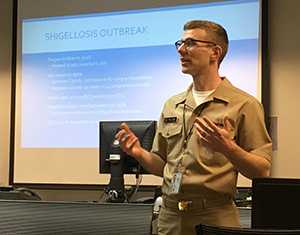Outbreak Response

Most outbreaks of enteric (gastrointestinal) illnesses are identified and investigated by local and state health departments. These types of outbreaks include foodborne and waterborne outbreaks and those caused by contact with animals (zoonotic outbreaks). CDC provides consultation on some of those investigations, as well as assistance for outbreaks that are particularly large, unusual, or severe. When fungal disease outbreaks occur, CDC’s Mycotic Diseases Branch works with federal, state, and local and territorial public health officials and other partners to reduce illness and deaths and to learn how to prevent future outbreaks.
Advanced Lab Methods Help Find Outbreaks
Whole genome sequencing (WGS) provides detailed genetic information about germs that make people sick. CDC uses this information to find, investigate, and prevent illnesses caused by bacteria, fungi and parasites. These capabilities are especially important when looking for the source of an outbreak or trying to predict antibiotic resistance in bacteria. WGS provides highly detailed and timely information that helps CDC and other government agencies protect the public’s health.
Short-term Epidemiologic Assistance
CDC helps investigate U.S. and global outbreaks when epidemiological assistance is requested. CDC can help in different ways, including assisting with emergency responses, and investigating infectious and environmental disease outbreaks. An “Epi-Aid” is a shorter-term CDC response to public health department requests.
Our global investigations are conducted in collaboration with international partners, such as ministries of health and the World Health Organization, as well as CDC’s Global Disease Detection and Emergency Response program.
- Page last reviewed: April 18, 2016
- Page last updated: September 25, 2017
- Content source:


 ShareCompartir
ShareCompartir